Singaporean in China: China's poor no longer beg, they livestream
Former journalist Jessie Tan muses over the phenomenon of those in need transitioning from begging on the streets to selling goods on Douyin. While the poor or disabled have been given a more dignified and effective source of income, this is just one aspect of the good that comes with social media and technology.
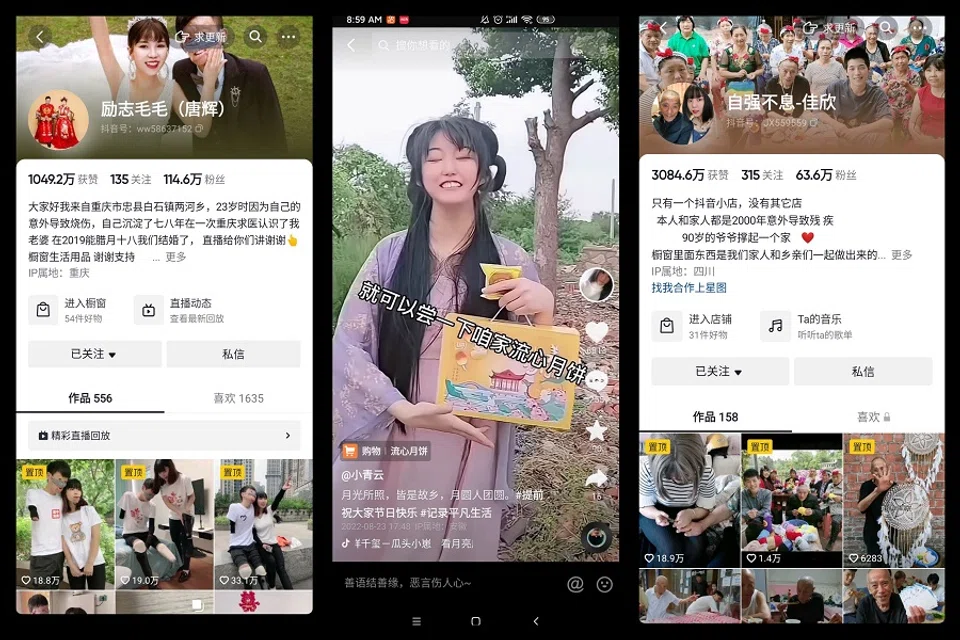
In the evening, one of my greatest guilty pleasures is to scroll through Douyin, the Chinese version of TikTok. While the Chinese sense of humour and their creativity in coming up with short videos is truly enjoyable, it is also a window to local Chinese thoughts and feelings about certain issues.
For example, when US House Speaker Nancy Pelosi visited Taiwan, I noticed how the netizens gradually shifted from baying for blood when Pelosi departed for Taiwan, to appealing to fellow Chinese to "trust the party" after Pelosi landed, and applauding the government for their biggest ever military drills in waters around Taiwan after Pelosi left.
For China-only audience
Despite being accessible only in mainland China, Douyin reportedly has over 700 million daily active users, and the variety of content available on the platform is incredible.
Aside from the standard fare of attractive influencers, content creators on Douyin also include professional mahjong players, traditional Chinese musicians and dancers, national athletes, and even professional guides who give live tours of ticketed tourist attractions for free. I often spend a whale of a time going through their videos and livestreams.
As with TikTok, when I open the Douyin app, the "For You" page is the first thing that pops up, consisting of content from creators that I do not follow but the app's algorithm believes would interest me. Usually, these recommendations consist of comedy and cute animal videos, which are in line with my viewing habits on Douyin - but one day I was shown a video of a mother and her cancer-stricken child.
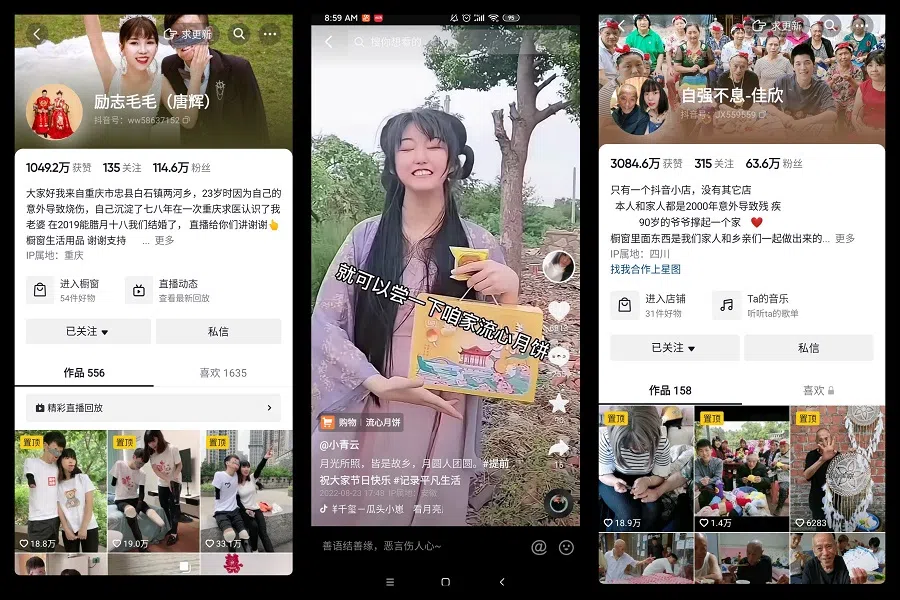
As I am a mother of two young children, the pain of seeing children suffering would usually prompt me to avoid the video and quickly scroll to the next one. But this time, I watched the three-minute photo and video montage in its entirety detailing how the active girl became a sickly and frail child lying on the hospital bed. Needless to say, it left me heavy-hearted.
As these creators are disabled or the primary caregivers of the disabled, and are unable to hold a stable job, such content could be their only source of income.
Beggars off the streets and onto screens
From then on, sensing that I'm drawn to such content, Douyin's algorithm recommended more stories of Chinese families that tug at the heartstrings.
There is the mother who suffered brain damage after giving birth to her son and is now learning how to walk and talk again; a couple who both have physical disabilities; a beautiful young lady with uncontrollable jerky limb movements which I believe is due to cerebral palsy; a pair of grandparents raising two grandchildren with developmental issues; a woman whose husband divorced her after finding out that their child has a congenital illness... Without fail, I would grieve for each of the subjects after I finish watching their videos.
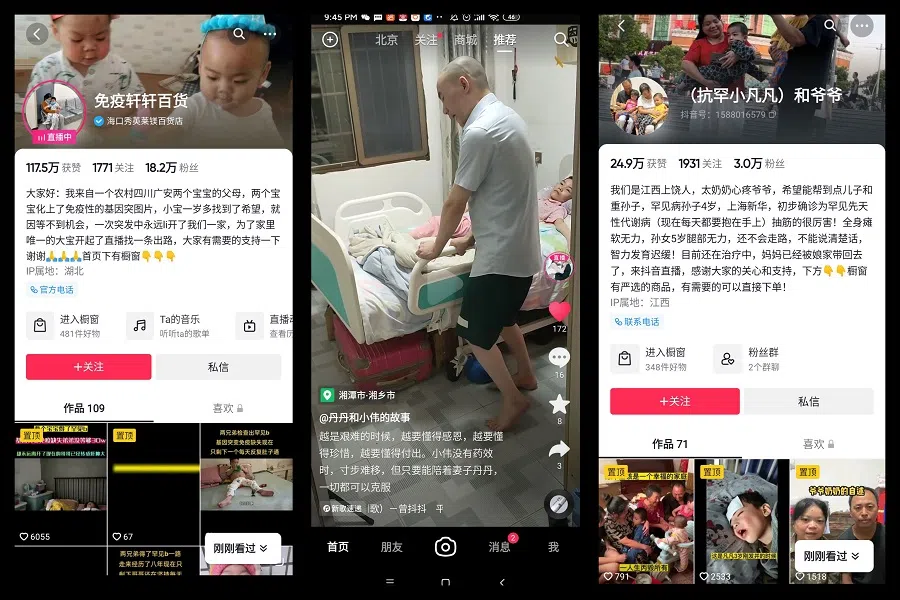
Interestingly, I noticed that these accounts would conduct regular or even daily livestreaming sessions to sell products ranging from daily necessities to foodstuff. As these creators are disabled or the primary caregivers of the disabled, and are unable to hold a stable job, such content could be their only source of income.
The decline in street beggars could also be due to the fact that the individuals are now begging from home using technology such as livestreaming.
In fact, beggars on the streets of Beijing have become few and far between. I encountered a man playing the erhu and a few middle-aged women selling roses at Sanlitun - a commercial centre similar to Singapore's Orchard Road - and a visually impaired man and his wife in the central business district, but that's about it. You can no longer see as many beggars as before at the popular tourist attractions such as the Forbidden City, Great Wall of China and Summer Palace.
Perhaps the pandemic has made it troublesome to travel between provinces, or the local police have been effective in clearing the Beijing streets of beggars. The decline in street beggars could also be due to the fact that the individuals are now begging from home using technology such as livestreaming.
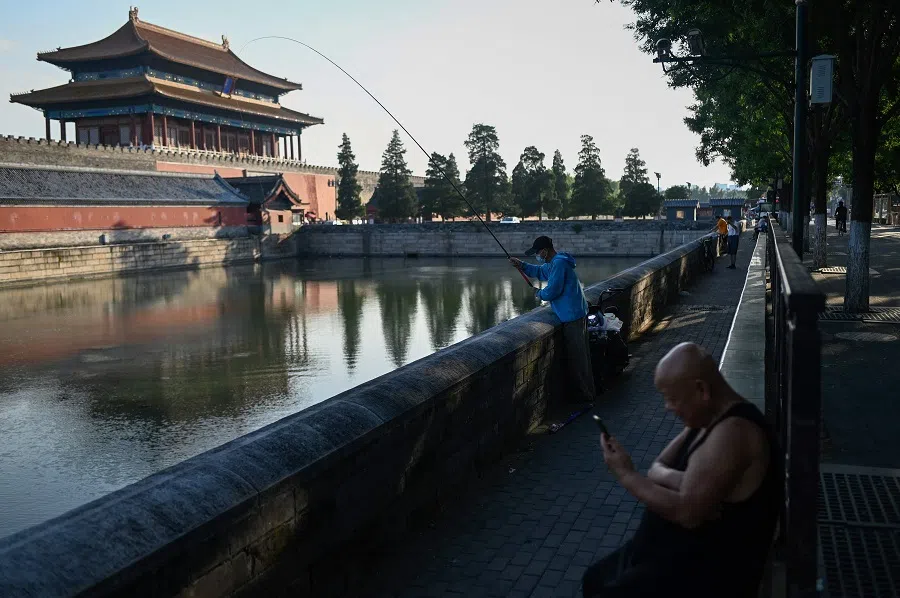
The advantages of doing so are obvious. First, they can stay in the relative comfort of their home to take care of their dependents or be taken care of by their family members without worrying about the elements, where to spend the night, when they will be chased away and whether people might steal their money when they are on the streets.
Second, they are no longer passively waiting for the generosity of passers-by, instead, they can actively seek out products to sell on their livestreams. The fact that they are making money from their efforts might also bring about feelings of dignity, compared with merely begging for alms. Third, they can now reach a bigger pool of buyers from the whole of China, instead of the limited number of passers-by on a stretch of street.
Numerous media have reported that with the help of various livestreaming and e-commerce platforms, some farmers have expanded their income, sometimes in the millions.
Improving fortunes for farmers
Livestreaming technology has also benefited rural farmers. Farmers well versed with these technologies can sell their produce directly to consumers and build rapport with regulars even if they are thousands of miles away. People often have a soft spot for the elderly farmers, with their tanned and wrinkly skin, smiling earnestly under straw hats, perhaps because they remind audiences of their own grandparents.
Furthermore, as their earning power has increased, the Chinese may prefer to buy directly from food sources that they believe are reliable and organic. Numerous media have reported that with the help of various livestreaming and e-commerce platforms, some farmers have expanded their income, sometimes in the millions.
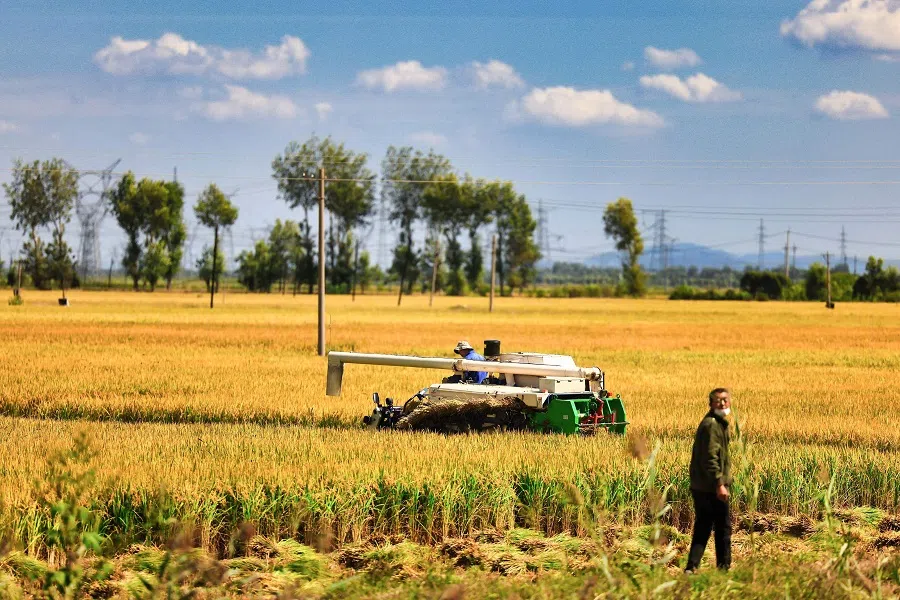
Of course, this is by no means the fortune of all farmers and the poor who turn to technology to seek a better life. Some livestreams only garner a handful of viewers and may not see even a single buyer after an hour of promotion.
Make no mistake, livestreaming is no longer a trend but the norm. Variety shows about celebrities visiting rural villages also tend to end with the stars doing a livestream to help sell local produce.
... would Singapore be able to do something similar to help those who are genuinely in need to earn a living in a different yet sustainable and more dignified and comfortable manner?
As I ponder this phenomenon, I am reminded of the elderly and disabled selling tissue packs outside the MRT stations and at hawker centres in Singapore. Even the numerous patients featured on the crowdfunding website Give.asia come to mind. Many of them travelled to Singapore to seek medical treatment for rare or complicated illnesses that cannot be treated in their home countries. They turned to crowdfunding as a means to alleviate the burden of the massive medical bills.
As a country that prides itself for being the first in the world to achieve full 5G coverage, and with so much resources dedicated to building a digital society, would Singapore be able to do something similar to help those who are genuinely in need to earn a living in a different yet sustainable and more dignified and comfortable manner?
Related: China's livestreaming e-commerce: The million dollar business fueling product innovation | How China is leading in the livestreaming e-commerce world | Chinese housewives: The driving force behind China's e-commerce platforms | Village entrepreneurs' love-hate relationship with e-commerce | Chinese villagers: The unsung heroes behind China's rapid AI development



![[Big read] When the Arctic opens, what happens to Singapore?](https://cassette.sphdigital.com.sg/image/thinkchina/da65edebca34645c711c55e83e9877109b3c53847ebb1305573974651df1d13a)
![[Video] George Yeo: America’s deep pain — and why China won’t colonise](https://cassette.sphdigital.com.sg/image/thinkchina/15083e45d96c12390bdea6af2daf19fd9fcd875aa44a0f92796f34e3dad561cc)
